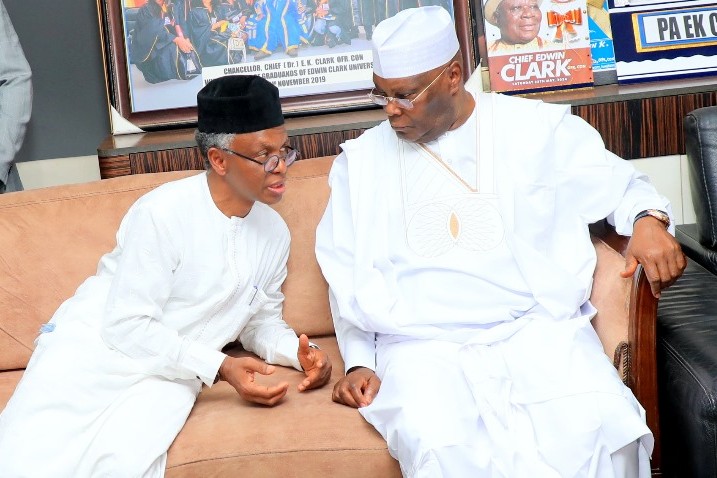ADA political party: All to know about Atiku, El-Rufai-led coaliton

All Democratic Alliance (ADA) gains momentum as opposition moves to defeat President Bola Tinubu in 2027.
In a bold political move aimed at unseating President Bola Ahmed Tinubu in the 2027 general elections, Nigeria’s opposition leaders have begun rallying behind a new platform known as the All Democratic Alliance (ADA).
The initiative, driven by the National Opposition Coalition Group, features some of Nigeria’s most influential political figures, including former Vice President Atiku Abubakar and former Kaduna State Governor Nasir El-Rufai.
The ADA is being positioned not just as another political party, but as a broad-based, reform-driven alliance that seeks to offer Nigerians a credible, unified alternative to the ruling All Progressives Congress (APC).
Why Now? The Drivers Behind ADA’s Formation
The idea of the ADA gained momentum in early 2025 amid widespread public dissatisfaction with Tinubu’s administration, particularly following the controversial declaration of a state of emergency in Rivers State.
The move, which suspended elected officials in the state, was condemned by opposition leaders who viewed it as unconstitutional and indicative of authoritarian overreach. This incident served as a catalyst for renewed cooperation among Nigeria’s fragmented opposition, inspiring talks of a united front to defend democracy and restore public confidence in the electoral system.
Coalition architecture and leading figures
Former Vice President Atiku Abubakar has been vocal about the need for a united platform. In a series of public statements, he described the ADA as a “fast-moving train” open to Nigerians of all backgrounds. He noted that the coalition is not wedded to any single political party but is willing to adopt whatever structure—be it ADA, ADC (African Democratic Congress), or SDP (Social Democratic Party)—that can best serve the collective interest of the opposition and the Nigerian people. El-Rufai, who recently distanced himself from the APC, has also thrown his weight behind the coalition, reportedly backing the SDP as a potential vehicle but remaining open to the ADA proposal.
Adding to the momentum is former Rivers Governor Rotimi Amaechi, who is credited with drafting the founding document of the ADA. Amaechi’s involvement has brought significant attention to the alliance, particularly from political stakeholders in the South-South region. He envisions the ADA as a “national renaissance movement” built on democratic values, moral clarity, and grassroots mobilisation. The symbolic logo of the ADA—a growing tree—represents strength, unity, and regeneration.
While the exact structure of the coalition is still being debated, three main options have emerged: forming a brand-new party under the ADA name, adopting the already-registered ADC, or leveraging the SDP’s existing structure. Each of these paths has its own supporters within the coalition, and internal debates around which to adopt have caused some delays in finalising a strategy. Notably, ADC is favoured by several PDP and LP elements for its reform credentials, while El-Rufai and his allies favour the SDP, and Amaechi champions ADA as an entirely new, neutral ground.
Despite these differences, there is consensus among coalition leaders that time is of the essence. With the 2027 elections drawing closer, the coalition has mapped out a timeline for engagement. On March 20, 2025, a major press conference held at the Shehu Musa Yar’Adua Centre in Abuja marked the public unveiling of the coalition’s intentions. Leaders including Atiku, El-Rufai, Peter Obi (represented by aides), and other stakeholders used the opportunity to outline their joint vision and denounce what they called the “slide toward dictatorship” under Tinubu.
Subsequent meetings have focused on resolving structural questions and developing a mobilisation plan. A significant milestone is expected around the end of May 2025, when the coalition is projected to hold a “National Declaration” event that will finalise the name, structure, and leadership of the movement. This declaration is expected to unveil state coordinators, campaign roadmaps, and the official unveiling of ADA (or the chosen platform) as the central opposition bloc going into 2027.
Still, the path to unity is fraught with challenges. Internal rivalries, conflicting ambitions, and ideological disagreements continue to threaten the stability of the coalition. There is also the risk of repeating past opposition failures, where multiple presidential candidates diluted their chances by running separately. Leaders like Atiku and Obi will need to set aside personal ambitions and work collaboratively if the coalition is to succeed in its mission.
The ruling APC is also not sitting idly by. Analysts expect the Tinubu administration to deploy both political and legal tactics to counter the growing momentum of the opposition. Already, accusations of harassment, surveillance, and attempts to co-opt opposition figures have surfaced, raising concerns about the democratic space in the lead-up to 2027.
Nevertheless, the emergence of the ADA has injected new energy into Nigeria’s political landscape. For the first time since the merger that created the APC in 2013, there is a serious and structured attempt to realign opposition forces across party lines. The coalition includes power brokers from the North, South-East, South-South, and Middle Belt, signalling a nationwide effort to dislodge the ruling party. With Nigeria facing economic hardship, insecurity, and institutional decline, the ADA is being marketed as the fresh start many citizens are yearning for.
Whether the All Democratic Alliance will succeed in its mission remains to be seen. But one thing is clear: Nigeria’s political terrain is shifting rapidly, and the battle for 2027 has already begun. If opposition leaders can overcome their differences and rally around a common agenda, the ADA may well become the most formidable challenge yet to President Tinubu’s re-election ambitions.

